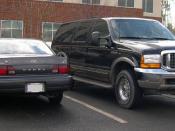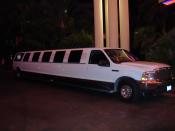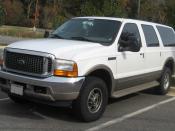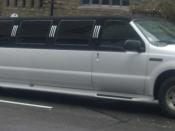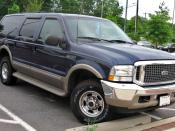SUVs, they're everywhere now, right? It seems everyone has one and they are the common replacement for the minivan. Manufacturers are constantly coming up with new models to meet consumers needs. But with prices ranging from $15,000 all the way up to $70,000 and gas prices going back up, which ones are better? What size is the best? What do you really need and how much should you spend? How safe are they? I recently did a lot of research on SUVs of all sizes thinking I was going to purchase one. After driving an economy car for 7 years, I was tired of looking into other peoples doors and struggling to see around larger cars in front of me. I wanted something that sat higher on the road with better visibility, had 4 doors and more storage, something with good safety ratings and versatile space. Well, after reading countless reviews, talking to people that own them and reading various articles on them, I decided not to purchase one.
Size does matter There are many different sizes of SUVs ranging from small to XXX-large with different engines, seating and towing capacity. Which is right? To decide this, make a list of everything you will need to do and things you will want to do on a regular basis. Do you need seating for more than 5 or do you think it would just be nice to have? Are you planning on towing? If so, how much weight? Look at models that would handle that weight. What if you're occasionally planning to tow or occasionally need more space for large objects? As I mentioned above, SUVs are very common now, surely you know someone that owns one or a truck that you can borrow or request a favor, right? If not, there's always U-Haul or Ryder, which may be cheaper for the occasional uses. Because of the varying price ranges on SUVs, you could waste a lot of money on buying something that you're not going to get the full potential from.
Don't forget, many minivans can tow also, usually around 3,500 lbs. which is fine for ski boats and many trailors. Also, minivans may have more versatile space with removable seats that can be re-arranged as needed, whereas in most SUVs, the back seats only fold down, but still take up space. Plus minivans are lower to the ground, making it easier to load large, heavy objects. Finally they usually get better gas mileage and are cheaper.
So, if you need something that seats 7+ people, which sounds better, a $40,000 SUV or a $20,000 minivan? The cost for large SUVs that seat more than 5 are getting insane. Compare your needs with other choices, such as a minivan and you could save a lot of money.
Gas mileage Gas is fairly cheap now. But for how long? I keep reading warnings from AAA and other news sources that gas prices are going up and it may not be long until we are paying the same for gas as Europe, well over $2 per gallon. Plus the government is trying to pass a new bill to increase the fuel economy standards by 50% by 2015.
Also, lower gas mileage can add a surprising amount to your bills. V8+ engines can use up to 3 times more gas than 4 cylinders, that's 3 times as much for gas each time you fill upâ¦ouch! Safety It seems that larger SUVs are the replacement for the family minivan, even though they are more expensive, not as safe and don't hold as much. Many families seem to think they're safer or just don't want a minivan. In my recent research, I found that most SUVs are not safer than minivans and every time I see one involved in a highway accident, they're up-side down or windshield first into the ground. It's rare that happens to a minivan. Check the roll over ratings on models you're interested in. An interesting comparison is the new VW Beetle has better crash test ratings that the Chevy Trail Blazer. Many SUVs are still built with utility/truck standards, meaning they don't have well designed crumple zones or firewalls that keep the engine from your lap. Minivans usually have great ratings because they are built like cars with crumple zones and firewalls. Some goods sites to do research at are: http://www.iihs.org http://www.nhtsa.dot.gov But make sure you know the model you pick is safe, don't assume it is.
Parking (or docking) For smaller SUVs (RAV4, CRV, VUE, etc.), parking is not a problem, I know, I test drove most of them. But for larger SUVs (Expedition, Excursion, Suburban, etc.), it's a little more tricky. An example, the average parking spot is 18 ft. long, the Ford Excursion is 19 ft. long, so when parking, you have to be careful not to hit the car in front and not to hang out the back too much. Oh and center as much as possible to make the door does not hit the car next to you or vice versa. Jeez, as if finding a good spot wasn't hard enough! Also, make sure it will fit in your garage. Some larger models will not or will be a tight fit.
InsuranceInsurance on SUVs can vary depending on state polices and restrictions. But, for the most part, SUV insurance costs are going up depending on the size and wait. Get a quote from a couple of different providers on the models you're interested in and make sure they factor into your budget. Also, check if they plan any rate hikes in the near future. The reason for the higher rates is insurance companies figure that large SUVs cause more damage in accidents and will be more expensive to replace with higher risk of law suits.
4WD While researching, I found myself thinking that it wouldn't be an SUV without 4WD, so it's a must have. It adds at least 300 lbs. of weight to the vehicle and can reduce the gas mileage and increase the price heavily. After realizing this, I decided it wasn't a must have.
As quoted from www.suv.org, 5% of SUVs actually go 4 wheeling or off-roading. Having 4WD can be good in snow, but not as good as many may think. The extra weight may be a traction nightmare in icy conditions. Considering that, is 4WD really needed? Resale The resale value of some SUVs, mainly large ones with big engines (V8 +), can fluctuate as gas prices do and when fuel economy requirement standards are tightened for the US. But, if the gas mileage is bad, people are not going to want it if prices are unstable.
Controversy? This is not a big deal at this point, but can become one as gas prices go up and people become more concerned about the environment. But it's something that is starting to appear in larger city areas, so here are some facts to help explain what's going on. Because SUVs are still classified as a truck or utility vehicle, they are allowed to put out about 30% more carbon monoxide than passenger cars. Many environmental sites claim that large SUVs waste 33% or more gasoline than passenger cars. This is based on power to gas mileage ratio. So if a passenger car had a V8 engine in it, the same size and power as an SUV, it would be required to out put 30% percent less carbon monoxide than the SUV. That's were a lot of the controversy is coming from, because SUVs are allowed to output more pollution. More information is available about this at http://www.suv.org.
Because more large SUV are appearing on the road, environmental activists are finding some extreme ways of dealing with this. One of the newer methods is called SUV tagging. Basically, they stick bumper stickers on large SUVs, saying things like "I Don't Care About The Air". There's even a web site where people can go and buy or print out there own bumper stickers at http://www.changingtheclimate.com and start their own activist chapter. Seeing this makes me wonder what the future holds and what might be the next step in this process.
Bills! Bills! Bills! Smaller SUVs with 4 and 6 cylinder engines are not really expensive, maybe a little more than an equivalent car, so car payments are fair. Usually the gas mileage is tolerable as well. I still recommend getting a quote for insurance.
But large SUVs tend to be more expensive, between $30,000 to $70,000. So you can imagine the car payment if you don't have a lot to put down. On top of that, there's the additional gas charges and higher insurance rates. As I said above, it's a big price difference from a minivan or a car and it does not seem worth it.
Summary I realize that SUVs are very popular now, but looking at these major considerations before purchasing may be crucial to your budget.

